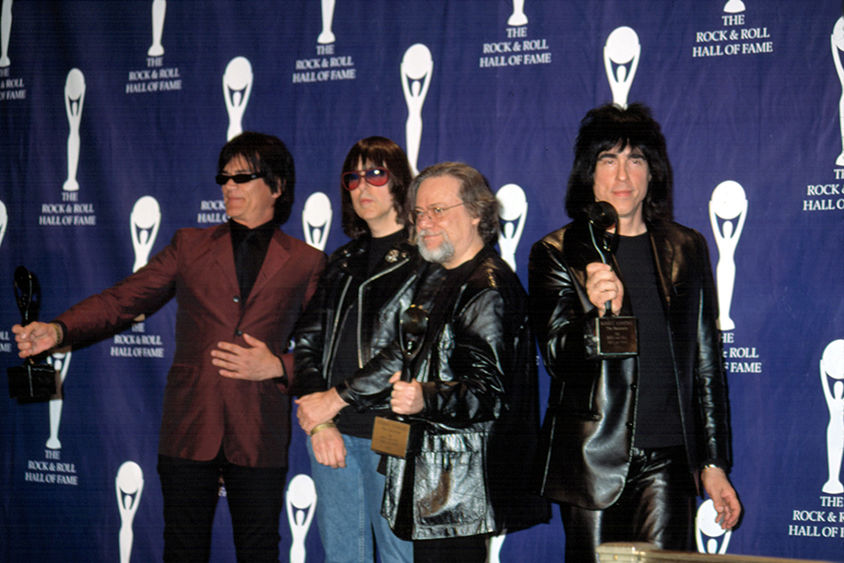Talking to my little brother Joe on the phone recently, we began reminiscing about growing up on the coast of New Hampshire. Five years apart, we’d never known that, as teenagers, we’d both kept a beat-up radio under our bed that we’d listen to, at the lowest possible volume so our parents wouldn’t hear, late at night.
“The songs!” I mused. “‘You Got Me Babe,’ ‘Downtown,’ ‘Morning Angel.’ Plus, very faintly in the distance, you could hear the traffic from I-95.”
“Yeah,” Joe agreed. “You heard those cars, traveling north and south in the night, and you knew you were on the verge of something. You didn’t know quite what it was, but you felt you were on the verge of something exciting and important.”
I grew up to be a writer. Joe grew up to head a punk band called The Queers.
That pretty much sums up my connection to punk. When I’m alone in the car, I tend to listen to Billie Holliday or Bach.
But I’ve always appreciated the raw DIY exuberance of punk, the insistence upon dressing like juvenile delinquents well into middle age and the songs glorifying the halcyon, tortured days of adolescence that, in my brother’s case, include “Teenage Bonehead,” “I Can’t Stand You” and “Hi Mom, It’s Me!”
The Grammy Museum, located in downtown’s L.A. LIVE district, is running an exhibit through Feb. 28 called “Hey! Ho! Let’s Go: Ramones and the Birth of Punk.”
The Ramones, widely acknowledged as the band that first defined the punk-rock sound, were formed in 1974 by four guys from a working-class neighborhood in Queens. Though unrelated, the members — lead singer Joey, bass guitarist Dee Dee, lead guitarist Johnny and drummer Tommy — all adopted Ramone as their fabricated stage surname.
The band first appeared in downtown Manhattan and quickly made CBGB, a Bowery biker bar, a regular venue. Their first press release, from 1975, reads, “The Ramones all originate from Forest Hills and kids who grew up there either become musicians, degenerates or dentists. The Ramones are a little of each.”
But, as the commentary has it, “Punk’s world takeover can be dated exactly, to July 4, 1976. The Ramones’ sensational performance that night, at London’s Roundhouse — their first outside the U.S. — sparked the fuse for the British punk explosion.”
Hyperactive and charismatic, they kept their early sets to a driving 15 minutes. Ira Robbins and Scott Isler of the alternative rock magazine Trouser Press describe the sound:
“With just four chords and one manic tempo, New York’s Ramones blasted open the clogged arteries of mid-’70s rock, reanimating the music. Their genius was to recapture the short/simple aesthetic from which pop had strayed, adding a caustic sense of trash-culture humor and minimalist rhythm guitar sound.”
Allmusic.com claimed that Joey’s “signature bleat was the voice of punk rock in America.”
The exhibit is timed to coincide with the 40th anniversary of the band’s self-titled debut album, and includes sections on the birth of punk, clothing and instruments, photos, videos and memorabilia, including Joey’s spring 1968 report card from Forest Hills High School showing 20 days absent, 15 days tardy and the comment, “Does not function as a member of class.”
You can also view handwritten lyrics to the song “Heidi is a Headcase,” a backstage hospitality crew list that includes a request for “two (2) dozen assorted donuts” and a fan letter to Dee Dee, circa 1989, pleading with him not to quit the band after a breakup: “Your heart will mend and your life will go on, but don’t quit the band. Please! From your #1 Fan, D. P.S. Sorry to hear about you and Vera! Life goes on! God loves you!”
The band played virtually nonstop for 22 years, logging 2,263 concerts worldwide. Though they never achieved mainstream commercial success, in their ripped jeans, Chuck Taylors and leather jackets, they did become countercultural icons. Their hits — “Teenage Lobotomy,” “Rockaway Beach” and “Blitzkrieg Bop” — remain anthems for punks, misfits and rebels-at-heart the world over.
The unrelenting schedule took its toll. Tommy was replaced on drums by Marky in 1978, who was in turn replaced by Richie in 1983, after which Marky returned. Dee Dee was replaced on bass by C.J. in 1989.
In 1996, the band toured with the Lollapalooza music festival, then gave a farewell concert at the Palace in Hollywood and disbanded. Joey died of lymphoma in 2001, Dee Dee of a heroin overdose in 2002, Johnny of prostate cancer in 2004 and Tommy of bile duct cancer in 2014.
Let’s pray that disaffected youths forever continue to sneak-listen to their favorite tunes late at night. Let’s pray for the childlike hope that — no matter our age — we are forever on the verge of discovering something as exciting, important and generous-in-spirit as, say, a new form of music.
As Johnny’s wife Linda concludes, holding court for a video interview in lime green dress and gold tiara: “That’s why everybody loves the Ramones. ‘Cause they’re fun.”
Heather King is a blogger, speaker and the author of several books.

